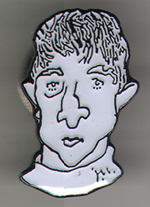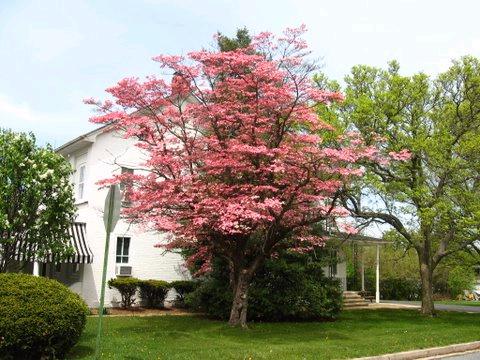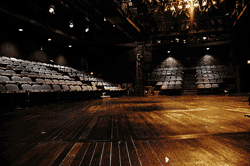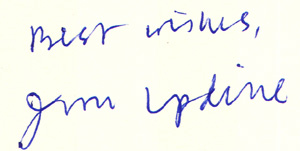 There’s only one way to get this collectible John Updike lapel pin, which is faithful to the self-portrait Updike did for his Paris Review interview, and that’s to pay your membership dues for 2010. And for those who aren’t already members, it’s not too late to join. Those who do so between now and our business meeting at the American Literature Association conference the end of May will still be considered Charter Members. The lapel pin features the Society logo, sans lettering, and the Society is grateful to Martha Updike for giving us permission to use the drawing. These pins will be a great way for us to instantly recognize fellow Society members at conferences like ALA!
There’s only one way to get this collectible John Updike lapel pin, which is faithful to the self-portrait Updike did for his Paris Review interview, and that’s to pay your membership dues for 2010. And for those who aren’t already members, it’s not too late to join. Those who do so between now and our business meeting at the American Literature Association conference the end of May will still be considered Charter Members. The lapel pin features the Society logo, sans lettering, and the Society is grateful to Martha Updike for giving us permission to use the drawing. These pins will be a great way for us to instantly recognize fellow Society members at conferences like ALA!
Monthly Archives: March 2010
The Dogwood Tree: March 18, 1932
 In perhaps his most famous autobiographical essay, “The Dogwood Tree: A Boyhood” (Assorted Prose, 1965), John Updike, who would have been 78 today, wrote:
In perhaps his most famous autobiographical essay, “The Dogwood Tree: A Boyhood” (Assorted Prose, 1965), John Updike, who would have been 78 today, wrote:
“When I was born, my parents and my mother’s parents planted a dogwood tree in the side yard of the large white house in which we lived throughout my boyhood. This tree . . . was, in a sense, me.” According to Updike’s Shillington contact, Dave Silcox, John’s mother later corrected him, telling him it was planted on the one-year anniversary of his birth.
In “The Dogwood Tree,” Updike continued with a line that has more resonance today than when he wrote it: “My dogwood tree still stands in the side yard, taller than ever . . . .”
Happy birthday.
(Photo courtesy of Jack De Bellis, taken in spring 2009)
New member treasures his encounter with J.U.
Professor Joseph McDade, of Houston Community College, is the most recent person to join the Society—our 153rd member—and like so many he’s planning on attending the Society’s first conference in October. Also like so many, he has a fond memory of meeting John Updike. His moment came on Monday, Feb. 28, 2008, when Updike spoke at Houston’s famed Alley Theater as part of the Inprint Brown Reading Series. But his relationship to John Updike began before that. He writes,
 “I am guessing my own life regarding the man is fairly common. All through college and grad school my mother would, every Christmas, treat me to each new handsome Knopf hardback, wrapped and under the tree. Lately my wife has continued the tradition, and this past December treated me to a copy each of Rabbit at Rest and Roger’s Version (I had mentioned these were my two favorite of his novels) from the Signed First Edition series.
“I am guessing my own life regarding the man is fairly common. All through college and grad school my mother would, every Christmas, treat me to each new handsome Knopf hardback, wrapped and under the tree. Lately my wife has continued the tradition, and this past December treated me to a copy each of Rabbit at Rest and Roger’s Version (I had mentioned these were my two favorite of his novels) from the Signed First Edition series.
“I count as one of the great moments of my life the 20 or so seconds I spent with him after his Houston reading two years ago, when I stood in a line that snaked up the stairs of the Alley Theatre to a desk on a second-floor landing. As he signed my evening’s purchase (the Everyman’s Library edition of Rabbit Angstrom: The Four Novels), I told him how happy I was that he had chosen, as part of the evening’s program, to read ‘The Family Meadow,’ a story I had often heard him read on audiotape and very nearly committed to memory. ‘It’s one of my two favorite of your stories,’ I said. Then, wanting to note it for the record, I continued, ‘The other is ‘The Witnesses.”
“‘The WITnesses’?” he asked, seeming slightly startled. I could only say, ‘Oh, sure,’ and move on.”
(Photo: The Alley Theater)
Joseph McDade
Rabbit, Run: Turning 50 and still hard to catch
In a 1992 interview on The Dick Cavett Show, John Updike told his host that he keeps all of his books from Knopf “in a row, without their jackets, and it’s in this set that I note the typos and gaucheries, so in a sense I have a master set, ready for the new editions and to be further refined.” When Cavett said that book collectors “would be horrified to know that the dust jackets aren’t on,” Updike responded, “Only this one set. Elsewhere in the same small room, there is a full set of them in their jackets and in their several editions and in their translations. It really is a room to enter. You’ve got to be pretty fond of me. Maybe only I can enter it.”
 A collector himself, John would always take note of an edition he was asked to sign. When I finally saved up enough money to buy a First Edition of Rabbit, Run many years ago, I sent it to him to sign. It came back with another gracious inscription, but with a Post-It note attached: “Jim—the book is a first edition, but the jacket is not [and he underlined “not”]. It quotes a review—the first had flap copy by me. Best, John.” I contacted the book dealer, who was one of the nation’s most reputable, and it was the first he’d known of this point, which wasn’t detailed in any catalog. But John noticed things like this. He was a stickler for detail and accuracy, as his readers well know. Unlike some authors who dated books if they were signed after publication year, John only dated a book if asked, or if it was a gift. He didn’t want to begrudge any collector his/her treasures.
A collector himself, John would always take note of an edition he was asked to sign. When I finally saved up enough money to buy a First Edition of Rabbit, Run many years ago, I sent it to him to sign. It came back with another gracious inscription, but with a Post-It note attached: “Jim—the book is a first edition, but the jacket is not [and he underlined “not”]. It quotes a review—the first had flap copy by me. Best, John.” I contacted the book dealer, who was one of the nation’s most reputable, and it was the first he’d known of this point, which wasn’t detailed in any catalog. But John noticed things like this. He was a stickler for detail and accuracy, as his readers well know. Unlike some authors who dated books if they were signed after publication year, John only dated a book if asked, or if it was a gift. He didn’t want to begrudge any collector his/her treasures.
According to Lawrence Grobel, who recently had an article on collecting Updike in Autograph Magazine, “pristine copies of his early signed books go for as much as $4500 (Rabbit, Run). Even 50 years after it was published, Rabbit, Run remains the most sought-after of Updike titles, but it’s awfully hard if not impossible to find a copy in pristine condition. Rare book dealer Ken Lopez has one for sale that’s fine in a near-fine, price-clipped dust jacket “with some slight rubbing and a tear at the lower rear spine fold,” signed, for $2000. There’s another copy on eBay now for $450 minimum bid, but it’s a little rough-looking and also has a signed bookplate—so Updike never held the book in his hands. But that’s all that seems to be out there right now, which would all but validate what Grobel is saying.
By comparison, Grobel says that signed copies of The Centaur are fetching $1800, while The Poorhouse Fair is commanding $875 and Pigeon Feathers $350. But the good news for new collectors just discovering Updike’s works is that the author so graciously signed so many books that there are a lot of the newer volumes out there for $100 or less. Hemingway and Fitzgerald Society members should be so lucky.
Will Kindle light a fire under Updike novel sales?
 The Associated Press and Best Ebook Reviews reported that Random House is adding 7000 additional ebooks to its e-catalog over the next few months. Though ebooks count for fewer than a 1 percent market share of total book sales, Random House ebook sales have experienced a triple-digit percent increase since the Amazon.com Kindle reader was introduced. Typical Kindle editions sell for $9.00, and Random House specifically said that John Updike’s novels will be among those digitalized in this new wave of ebooks. For more information, see “Kindle Reader Impact–Random House ebook sales increase over 100%,” and thanks to Jack De Bellis for drawing it to our attention.
The Associated Press and Best Ebook Reviews reported that Random House is adding 7000 additional ebooks to its e-catalog over the next few months. Though ebooks count for fewer than a 1 percent market share of total book sales, Random House ebook sales have experienced a triple-digit percent increase since the Amazon.com Kindle reader was introduced. Typical Kindle editions sell for $9.00, and Random House specifically said that John Updike’s novels will be among those digitalized in this new wave of ebooks. For more information, see “Kindle Reader Impact–Random House ebook sales increase over 100%,” and thanks to Jack De Bellis for drawing it to our attention.
